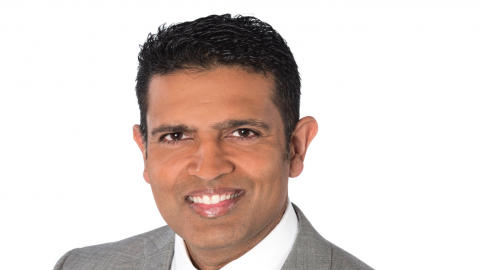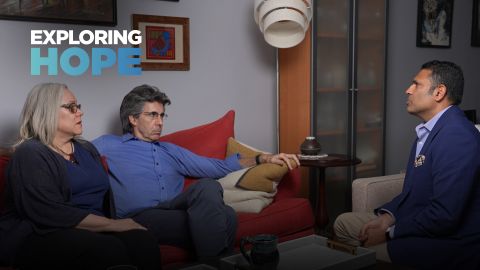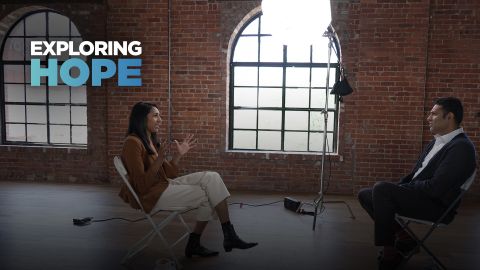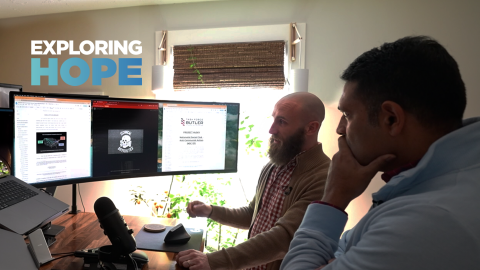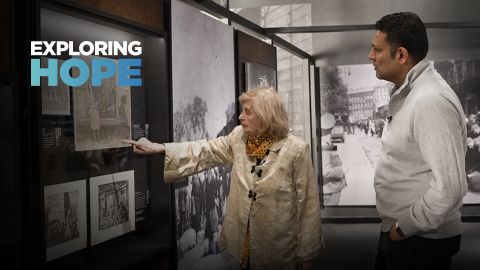ALEX EDELMAN: I’m from this really racist part of Boston, called Boston.
HARI SREENIVASAN: Alex Edelman is a comedian who was raised in an Orthodox Jewish household in Brookline, Massachusetts just outside of Boston. He’s appeared on Comedy Central, Stephen Colbert and Conan.
ALEX EDELMAN: I’ve never had bacon. I’m that kind of Jew, I’ve never tried bacon, I’ve tried cocaine, but I’ve never tried bacon.
HARI SREENIVASAN: His humor reflects his upbringing and examines antisemitism, racism and Jewish identity.
ALEX EDELMAN: Judaism is the Hotel California of religions. It is a mailing list you can never unsubscribe from.
HARI SREENIVASAN: We met up with Edelman in his hometown to talk about humor, hate and where the two meet.
ALEX EDELMAN: I think comedy and discomfort are like right up there against each other, especially the best comedy. You know, we used to have great antisemites like Henry Ford, Henry Ford, invented cars, created jobs. These were antisemites.
HARI SREENIVASAN: Edelman’s one man show, titled just for us, includes the story of how he crashed a meeting of neo-Nazis in Queens, New York. You’ll have to come to the show to find out how that worked out. The production has toured through Boston, London and New York and opened on Broadway in June.
ALEX EDELMAN: Wow.
HARI SREENIVASAN: Alex?
ALEX EDELMAN: Yeah, hey Hari.
HARI SREENIVASAN: Come on in.
ALEX EDELMAN: Hey, this is bananas. Let’s go get something to eat.
ALEX EDELMAN: This is my like neck of the woods. And I think a lot of the restaurants I grew up with are still open. So, Boston was a great place to grow up, it’s a big little city. Everyone comes through, you can go see like the Dalai Lama on a Friday night. It was like a mixture of big world and small world especially for me, it was religious.
HARI SREENIVASAN: When did you get into comedy?
ALEX EDELMAN: Mmm, you know I was 15, maybe a little older. I can’t remember.
HARI SREENIVASAN: Did you think you were funny?
ALEX EDELMAN: No, I still don’t think I’m funny. I went to go see a show called comics come home and it blew my mind. The jokes were these really beautiful little funny ideas. And not a single one of them was Jewish. Not a single one. But there was something very, Talmudic? Also, who doesn’t love to laugh? Like I want my show to be a night out for people, even if they’re gonna have to think about something, and there’s a little more heft there. Like, it should be a night at the theater where you’re laughing.
ALEX EDELMAN: I remember the first time I was aware of being Jewish. I should have been aware like eight days in, but the first time I was aware, it’s the first time you’re changed by it right? The first time I was aware, I was at a children’s birthday party at a Chuck E. Cheese in Natick, Massachusetts. But I reached for a slice of pizza that had some sausage on it or pepperoni, something not kosher. And my grandfather was there and he kicked my hand- kicked. And he said, “You can’t have that, David. We’re Jewish.” And I said- …”What does that mean?” And he said, “It means you’ll never be happy.”
ALEX EDELMAN: Milchig.
HARI SREENIVASAN: Milchig.
ALEX EDELMAN: Milchig and fleishig. Fleishig means meat, you can’t have a restaurant that has milchig and fleishig. It either has to have milk or it has to have meat.
HARI SREENIVASAN: Got it.
ALEX EDELMAN: So, this place is milchig. And this place is fleishig. Rami’s is probably the best.
ALEX EDELMAN: Do you have shawarma today?
CLERK: Yes.
HARI SREENIVASAN: And what’s good for a vegetarian?
CLERK: Falafel. That’s what we’re known for.
HARI SREENIVASAN: That looks good.
ALEX EDELMAN: It’s really good.
HARI SREENIVASAN: Taking you back?
ALEX EDELMAN: This is a taste of my childhood right here.
HARI SREENIVASAN: In your show, you talk about how you met a comedian, who is kind of telling you comedy’s potential?
ALEX EDELMAN: I ran into a comic that I really admire. And she said to me, hey, you should try to make your comedy a little more a little more ambitious, you should write a political show. I took this as a little challenge to do a show that was personal, and funny, and accessible, and specific, and political. And it took years to put together, it took like four years to put together, this show.
ALEX EDELMAN: The show is about me going to this meeting of white nationalists.
HARI SREENIVASAN: Some would say going to a meeting of white nationalists was an unusual choice for a Jewish comedian.
HARI SREENIVASAN: What made you want to go to a place? Well, I guess what was the hook that drew you in?
ALEX EDELMAN: I’ll go anywhere, all I ever wanted was to go to different places, you know, like, I’m curious, like, it’s my defining characteristic, being curious. I am earnestly interested in people whose lives are different from mine, I’m curious about the reasoning behind it. Sometimes you get there and find that there’s not much reasoning. That meeting that I went to is not the only time I’ve hung out with people who have lots of hate in them. I grew up in Boston.
HARI SREENIVASAN: What would you like people who experienced your show to feel or think, as they leave? Is there anything else as the creator of this work that you have an intent for?
ALEX EDELMAN: That’s such a good question, I love to induce doubt. You know, like my show is, in some, in some ways, it’s sort of tangentially about this relationship between Jews and whiteness, to me, it’s a show about assimilation. And it’s a show about identity. Which is why I think you can enjoy it if you’ve never met a Jew in your life. I did the show in Wales to people who came up to me after and said, we’ve never met Jews- totally fine, they loved the show, it was fine.
HARI SREENIVASAN: Do you think that antisemitism is worse now than when you were growing up as a kid?
ALEX EDELMAN: I don’t know. Genuinely. I have no idea.
HARI SREENIVASAN: Is it just because we’re seeing it more because you have Twitter?
ALEX EDELMAN: That’s what that’s what I mean, like, I don’t know, I think antisemitism, I’ve never been surprised by antisemitism, that’s the thing, I know that lots of Jews don’t feel safe, I know some of that is correlated with how Jewish they appear, which is really a problem. People come up to me after shows in comedy clubs in places that are not New York and Los Angeles and tell me very happily that they don’t like Jews, but that I’m okay. And now I’m just like, ok, you know. Thanks.
ALEX EDELMAN: This is a bookstore that carries Judaica.
HARI SREENIVASAN: The Israel Bookshop. This is little Israel.
ALEX EDELMAN: This can be the poster for my show. Just me in front of a whole bunch of you know. This is such a hyper specific thing, like some of these titles won’t even make sense to you. So, like if you’re raised this specific you have to talk about it. I didn’t want to for a long time.
ALEX EDELMAN: My full name, get ready, isn’t Alex Edelman, my full name is David Yosef Shimon Ben Elazar Reuven Alexander Halevi Edelman. That is my full name, I go by Alex now and my family has noticed the change.
HARI SREENIVASAN: Oh, now you’re talking my language
ALEX EDELMAN: The rugelach here is really solid.
HARI SREENIVASAN: You’re going to Broadway. How’d that happen?
ALEX EDELMAN: It genuinely is the craziest thing that’s ever happened to me. So, like I started doing the show, in like 20-person rooms. It’s kind of built and built. And we got some really nice reviews. But I never ever thought I’d get a chance to do a Broadway show.
HARI SREENIVASAN: It’s just interesting that it keeps having this set of legs.
ALEX EDELMAN: Jews feel seen by the show because it’s specific, but it’s still comedy, it’s still really accessible for folks. And, and people seem to really appreciate, the stand-up and the jokes and the questions that are in it, no matter if they’re Jewish or not. Afterwards, I stand outside. And I answer any question anyone has about like identity or Judaism, or the show and I’ve had a whole bunch of like, really interesting, crazy conversations.

